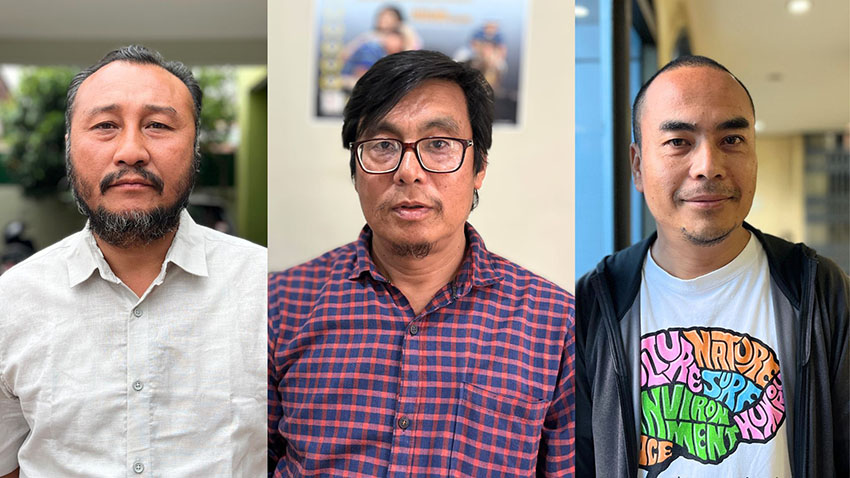Nagaland Governor RN Ravi has threatened to take over the administration of the state by invoking a special provision of the Constitution, severely undermining the role of the elected government.
Many in the state, however, say that it’s the Central government which should have taken it upon itself to address the problems raised by the Governor in his criticism the state government.
Ravi, who is also the interlocutor in the ongoing peace talks with Naga insurgent groups, in a letter to Chief Minister Neiphiu Rio on June 16, proposed to “periodically review the law and order in the state and issue required lawful directions.”
In the four-page letter, the Governor went ahead to propose that henceforth, his approval would be required before taking any “important law and order decisions like transfer and postings of officials entrusted with maintenance of law and order responsibilities of and above district level.”
For his proposed encroachment into the domain of the democratically elected state government, Ravi warned he would be forced to invoke the “special responsibility” that the Article 371(A) of the Indian Constitution entrusted to the Governor of Nagaland on matters pertaining to law and order.
The Governor indicated he is peeved by what he called “unrestrained depredations by over half a dozen organized armed gangs, brazenly running their respective so-called ‘governments’ challenging the legitimacy of the state government without any resistance from the state’s law and order machinery.”
Describing the scenario in the state as grim, the Governor stated that the “law and order has collapsed” in the state.
“The Constitutionally established state government is being challenged on a day-to-day basis by the armed gangs, who question the sovereignty and integrity of the nation while the instruments of law and order remain totally unresponsive,” Ravi wrote in his missive.
The rampant extortion by insurgent groups, particularly from the business community, is severely crippling the state’s economy. Recently, the Dimapur Chamber of Commerce and Industry (DCCI), Public Action Committee (PAC) of the Naga Council Dimapur, and other organisations also raised concern over the menace. Dimapur is the commercial capital of the state.
The trade bodies and other organisations pointed out that when police personnel were engaged in the battle against the COVID-19 pandemic, the insurgent groups, taking advantage of the situation, had increased “illegal tax” collections.
The insurgent groups in the state levy “tax” even on government officials. Last few years, people started to feel the pinch of these tax collections was more as the number of insurgent groups had proliferated following splintering of parent organisations.
Before Ravi took over as the Centre’s interlocutor in the Naga peace process in August 2014, the state had three major militant outfits: the NSCN (IM), NSCN (K) and NSCN (Unification). NSCN refers to the National Socialist Council of Nagaland. The number has now increased to five, not to mention about the several other dormant groups.
On many occasions, even some “miscreants” had extorted money from people in the name of these insurgent groups. On June 23 night, a former havildar of Indian Army, Khehuto I Assumi, was shot dead by an anti-extortion team of Kohima police while he was extorting money from shopkeepers. The deceased was discharged from the Army on health grounds only last year.
The general perception in the state is that lingering of the peace process with the militant groups without any solution at sight is largely responsible for the present situation as almost all these groups enjoy certain impunity being in the ceasefire agreement with the central government.
It is reliably learnt that during a meeting that Chief Minister Rio and his cabinet colleagues had with the Governor on June 19, the latter was briefed about the constraint faced by the state government in enforcing law and order due to the truce agreement.
It was reportedly pointed out to him that the violation of any ceasefire agreements by the groups is monitored directly by the Cease-Fire Monitoring Group (CFMG) under the ministry of home affairs.
President of the ruling Nationalist Democratic Progressive Party (NDPP), Chingwang Konyak, too said that these problems of extortion and other related law and order issues would be over automatically once a “permanent solution is found to the Naga political problem.”
Governor Ravi, being an interlocutor, cannot also escape his share of responsibility for the stalemate in the peace process, which is ultimately leading to the current law and order problems, he said.
The much-hyped framework agreement signed in presence of Prime Minister Narendra Modi in August 2015 with the National Socialist Council of Nagaland (Isak-Muivah) did not yet lead to a final settlement. “The peace talks have been reduced to an empty rhetoric of Modi with no concrete forward movement,” said former Nagaland chief minister KL Chishi.
Even legal experts believe that the governor is trying to overstep his brief in the guise of discharging constitutional responsibility, and is trying to make the state government a scapegoat for the Centre’s failure to enforce the ground rules of the ceasefire agreement.
“The Governor should be extremely cautious in invoking the special provisions of the Constitution against a democratically elected government. The present situation in Nagaland is a matter of concern, but it does not qualify to be deemed as a fit case to invoke the special provision of the Constitution,” said Hafiz Rashid Ahmed Choudhury, a senior lawyer at the Gauhati High Court.
Incidentally, the BJP is a coalition partner in Rio’s NDPP-led government in Nagaland.
(Pubished with special arrangement with author and The Federal)











